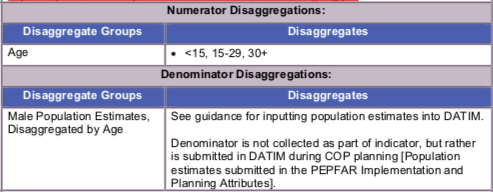(VMMC_TOTALCIRC_NAT) Percentage of men ever circumcised
Export Indicator
There is compelling evidence that male circumcision provided by well-trained health professionals in properly equipped settings is safe and can reduce the risk of heterosexually acquired HIV infection in men by approximately 60%. WHO/UNAIDS recommendations emphasize that male circumcision should be considered an efficacious intervention for HIV prevention in countries and regions in which heterosexual activity plays a significant role in HIV transmission.
This indicator is harmonized with GAM indicator “Percentage of men 15–49 that are circumcised.”
Total number of men ever circumcised
Total population of men in the corresponding age category
How to collect:
Estimates derived from population-based surveys (Demographic and Health Survey, AIDS Indicator Survey, Multiple Indicator Cluster Surveys or other representative surveys); this indicator will help to determine male circumcision prevalence. The total number of men circumcised should include all men circumcised regardless if circumcised at birth, as part of the VMMC program or at any other time during their lifetime.
The denominator for this indicator is the number of male populations estimates, disaggregated by age (<15, 15-29, 30+). This information is collected under the population estimates indicator in the IMPATTS (Implementation and Planning Attributes).
A guide to indicators for male circumcision programs in the formal health care system. Geneva, World Health Organization/UNAIDS, 2009. http://whqlibdoc.who.int/publications/2009/9789241598262_eng.pdf
Reporting level: National and Sub-national: Data should be entered for all SNUs, regardless of PEPFAR- funded support for these geographical areas; so that the total of the sub-national number should equal the total number of national number.
Reporting frequency: Annually

Indicator changes (MER 2.0 v2.3 to v2.4): None
Data entered by: This data should be entered in DATIM by the USG country team.
Guiding narrative questions:
- Narratives should include information on how national and subnational totals have been derived for both results and targets.